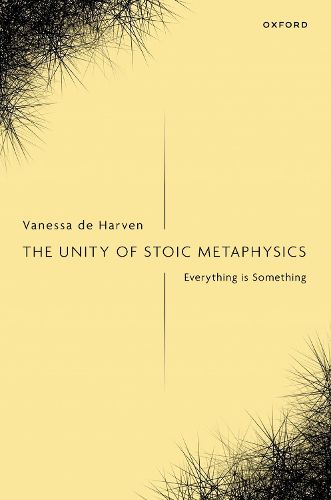Readings Newsletter
Become a Readings Member to make your shopping experience even easier.
Sign in or sign up for free!
You’re not far away from qualifying for FREE standard shipping within Australia
You’ve qualified for FREE standard shipping within Australia
The cart is loading…






The Unity of Stoic Metaphysics argues that the Stoics were sophisticated metaphysical thinkers responding to Plato's Sophist and forging a bold new path between materialism and idealism, with a one-world metaphysics best characterized as non-reductive physicalism. The book is divided into five sections:Section I, Something, develops the suggestion that the Stoics arrived at the genus Something and their two ontological criteria for being Something by careful reflection on Plato's Sophist, finding new depth to Plato's challenges as well as to the Stoic response.Section II, Bodies, offers an account of Stoic corporealism that takes us from the ontology of what exists to the metaphysics of body, explaining how body can be the fundamental grounds of the cosmos and how qualities can be corporeal. Section III, Incorporeals, takes us beyond corporealism to physicalism. It argues that the Stoic incorporeals--space, time, and the lekta, or sayables--are all dependent on body for their subsistence, inheriting their spatial, temporal, and semantic properties from underlying body without being nothing but the body. Section IV, Neither Corporeal nor Incorporeal, argues in support of a tripartite ontology that includes a third class of entities that are neither corporeal nor incorporeal--limits of the continuum, geometrical limits, and creatures of fiction.Section V, Everything, returns to the Stoic ontology, arguing that concepts are not Something, thus no reason remains to posit a further class of entities, Not-Somethings (outina), in metaphysical limbo between Something and nothing at all. The genus Something is complete and comprehensive as it stands. Everything is Something.
$9.00 standard shipping within Australia
FREE standard shipping within Australia for orders over $100.00
Express & International shipping calculated at checkout
The Unity of Stoic Metaphysics argues that the Stoics were sophisticated metaphysical thinkers responding to Plato's Sophist and forging a bold new path between materialism and idealism, with a one-world metaphysics best characterized as non-reductive physicalism. The book is divided into five sections:Section I, Something, develops the suggestion that the Stoics arrived at the genus Something and their two ontological criteria for being Something by careful reflection on Plato's Sophist, finding new depth to Plato's challenges as well as to the Stoic response.Section II, Bodies, offers an account of Stoic corporealism that takes us from the ontology of what exists to the metaphysics of body, explaining how body can be the fundamental grounds of the cosmos and how qualities can be corporeal. Section III, Incorporeals, takes us beyond corporealism to physicalism. It argues that the Stoic incorporeals--space, time, and the lekta, or sayables--are all dependent on body for their subsistence, inheriting their spatial, temporal, and semantic properties from underlying body without being nothing but the body. Section IV, Neither Corporeal nor Incorporeal, argues in support of a tripartite ontology that includes a third class of entities that are neither corporeal nor incorporeal--limits of the continuum, geometrical limits, and creatures of fiction.Section V, Everything, returns to the Stoic ontology, arguing that concepts are not Something, thus no reason remains to posit a further class of entities, Not-Somethings (outina), in metaphysical limbo between Something and nothing at all. The genus Something is complete and comprehensive as it stands. Everything is Something.